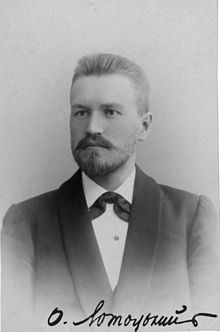| Oleksander Lototsky Олекса́ндр Гна́тович Лото́цький | |
|---|---|
 | |
| Chancellor | |
| In office 13 August 1917 – 20 November 1917 | |
| Prime Minister | Volodymyr Vynnychenko |
| Preceded by | Pavlo Khrystiuk |
| Succeeded by | Ivan Mirnyi (acting) |
| State Controller | |
| In office 8 February 1918 – 29 April 1918 | |
| Prime Minister | Vsevolod Holubovych |
| Preceded by | Aleksandr Zolotaryov |
| Succeeded by | Georgiy Afanasiev |
| Minister of Confessions | |
| In office 25 October 1918 – 14 November 1918 | |
| Prime Minister | Fedir Lyzohub |
| Preceded by | Vasyl Zenkovsky |
| Succeeded by | Mykhailo Voronovych |
| Ambassador of Ukraine to Turkey | |
| In office 1919–1920 | |
| President | Symon Petlyura |
| Preceded by | Mykhailo Sukovkin |
| Succeeded by | Ivan-Stepan Tokarzhevsky |
| Minister of Internal Affairs | |
| In office 1927–1930 | |
| Prime Minister | Vyacheslav Prokopovych |
| Personal details | |
| Born | (1870-09-03)3 September 1870 village of Bronnytsia, Podolia Governorate |
| Died | 22 October 1939(1939-10-22) (aged 69) Warsaw |
| Political party | UPSF |
| Alma mater | Kiev Theological Academy |
| Occupation | diplomat, statesman, public activist |
Oleksander Lototsky (Ukrainian: Олекса́ндр Ігна́тович Лото́цький; Russian: Алекса́ндр Игна́тьевич Лото́цкий) was a Ukrainian statesman, diplomat, writer, and scientist. He was a member of the Association of the Ukrainian Progressionists (TUP).
Biography
Lototsky graduated from the Kiev Theological Academy in 1896. In 1900-17, he worked in the office of state controller in Kiev and Saint Petersburg. During World War I Lototsky served as a gubernatorial commissar of Bukovina and Pokuttia. In 1917, he also one of organizers of the Ukrainian National Council in Saint Petersburg.
In January 1918 he went to Kiev and was immediately appointed Secretary General (Minister) in the General Secretariat of the Ukrainian Centralna Rada. In the spring of 1918 he was briefly Minister of State Control in the government of the Ukrainian People's Republic, and in the Ukrainian State he was Minister of Religious Affairs in October/November 1918. As such, he was instrumental in the January 1, 1919 declaration of autocephaly of the Ukrainian Orthodox Church.
In January 1919, he was appointed Ambassador of Ukraine to Turkey, and traveled to Constantinople on a diplomatic mission to obtain recognition of the status of the new church from the Patriarch of Constantinople. Due to the occupation of Turkey by the Entente and the Bolshevik takeover of Ukraine, he emigrated to Vienna in March 1920 and to Prague in 1922, where he was a lecturer and eventually professor of canon law at the Ukrainian Free University until 1928. From 1929 until his death he was professor of Orthodox Church history at the University of Warsaw.
Between 1930 and 1939 he was director of the Ukrainian Scientific Institute in Warsaw. He also served as Minister of the Interior and Deputy Prime Minister of the Government-in-Exile of the Ukrainian People's Republic from 1927 to 1930.
He died in Warsaw at the age of 69. His ashes were transferred to St. Andrew Cemetery in South Bound Brook, New Jersey, United States, in 1971 and reburied.
Lototsky had a daughter Oksana who married Ivan-Stepan Tokarzhevsky.
External links
Reference
- "Поборник української соборності - Олександр Гнатович Лотоцький | Національна бібліотека України імені В. І. Вернадського". www.nbuv.gov.ua. Retrieved 9 March 2024.
- Istorychnyĭ z͡hurnal: naukove-hromadsko-politychne vydanni͡a (in Ukrainian). Vyshcha shkola. 2003. p. 53. Retrieved 9 March 2024.
- Dzeverin, Igorʹ Aleksandrovich (1995). Ukraïns'ka lìteraturna enciklopedìâ: K-N. T. 3 (in Ukrainian). Hol. red. Ukr. rad. ent︠s︡yklopediï im. M.P. Baz︠h︡ana. p. 231. ISBN 978-5-88500-003-1. Retrieved 9 March 2024.
- "Lototsky, Oleksander". www.encyclopediaofukraine.com. Retrieved 2023-10-12.
- "До 150-річчя від дня народження Олександра Гнатовича Лотоцького, українського громадсько-політичного діяча, науковця, публіциста, перекладача та письменника". cdiak.archives.gov.ua. Retrieved 9 March 2024.
- "Lototsky, Oleksander". www.encyclopediaofukraine.com. Retrieved 2023-10-12.
- Андрєє, Віталій (2020). УКРАЇНСЬКЕ ПОСОЛЬСТВО 1919 р. У ТУРЕЧЧИНІПІД ГОЛОВУВАННЯМ О. ЛОТОЦЬКОГО: НА ШЛЯХУ ДО ПРОГОЛОШЕННЯ АВТОКЕФАЛІЇ УКРАЇНСЬКОЇ ПРАВОСЛАВНОЇ ЦЕРКВ (PDF). Всеукраїнської наукової онлайн-конференції за міжнародною участю. Kyiv. pp. 178–179.
- Isichenko, Ihor (2003). Історія христової церкви в Україні (in Ukrainian). Акта. ISBN 978-966-7021-72-6. Retrieved 9 March 2024.
- Shvydkyĭ, Vasylʹ (2002). Олександр Лотоцький: учений, громадський діяч, політик : 1890-1930-ті рр (in Ukrainian). Інститут історії України НАН України. ISBN 978-966-02-2136-9. Retrieved 9 March 2024.
- Studiï z arkhivnoï spravy ta dokumentoznavstva (in Ukrainian). Holovne arkhivne upravlinni͡a pry Kabineti Ministriv Ukraïny, Ukraïnsʹkyĭ derz͡havnyĭ naukovo-doslidnyĭ instytut arkhivnoĭ spravy ta dokumentoznavstva. 1999. p. 214. Retrieved 9 March 2024.
- "Олександр Лотоцький. Про автора. Українська культура. Збірка лекцій". litopys.org.ua. Retrieved 2023-10-12.
- "ЛОТОЦЬКИЙ ОЛЕКСАНДР ГНАТОВИЧ". resource.history.org.ua. Retrieved 2023-10-12.
- Partykevich, Andre (1998). Between Kyiv and Constantinople: Oleksander Lototsky and the Quest for Ukrainian Autocephaly. CIUS Press. pp. 8, 59. ISBN 978-1-895571-27-1. Retrieved 9 March 2024.
| Ukrainian National Council in Petrograd | |
|---|---|
- 1870 births
- 1939 deaths
- People from Vinnytsia Oblast
- People from Mogilyovsky Uyezd (Podolian Governorate)
- Ukrainian Democratic Party (1904) politicians
- Politicians from the Russian Empire
- Interior ministers of Ukraine
- Members of the Ukrainian government in exile
- State controllers of Ukraine
- Members of the Central Council of Ukraine
- Ambassadors of Ukraine to Turkey
- Writers from the Russian Empire
- Kiev Theological Academy alumni